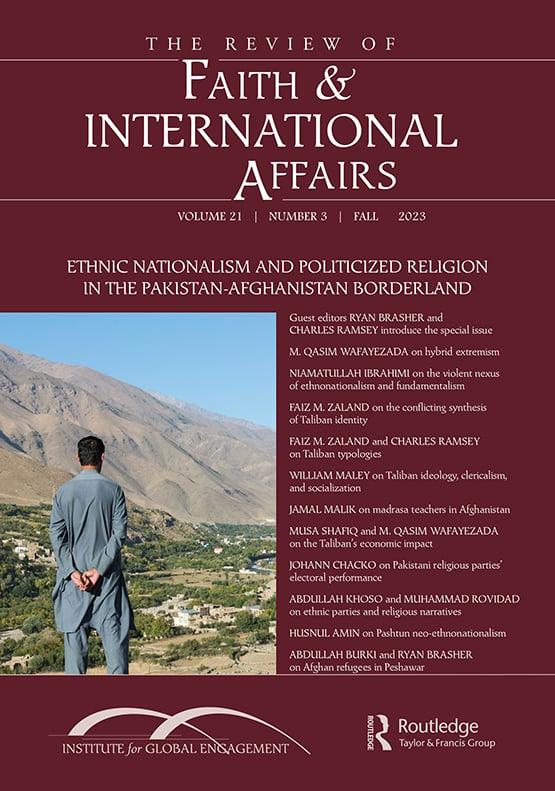
Violent extremism has been, and remains, a driving force for the instability plaguing both Pakistan and Afghanistan. RFI Senior Fellow Charles Ramsey and Ryan Brasher, Professor of Political Science at Simpson University, address this theme in their introductory article to the issue, “Ethnic Nationalism and Politicized Religion in the Pakistan-Afghanistan Borderland.” They explain that support for the Taliban and related militant groups can be seen in many locations throughout the two nations, but these groups have consistently found support and willing hosts among communities along the contested Afghanistan-Pakistan border. The border follows the Durand Line, which was purportedly demarcated according to a 100-year agreement between British India and Emir Abdur Rahman Khan (r. 1880–1901). Indeed, many of the fault lines that continue to beset these two countries and their national identities are traceable to this time period.
Today the interplay of ethnicity, nationalism, and religion continues to shape the political, economic, and social trajectory of these two nations, often with global repercussions.
But how do religion, nationalism, and ethnic identity shape the social and political landscape in Afghanistan, Pakistan, and the turbulent border region between them? And to what extent does the tribal and ethnic Pashtun ethos of the Taliban co-exist with its unique brand of political Islam? Are Afghan refugees able to assimilate into a new Pakistani identity, and how do their religious beliefs affect this assimilation? To what extent do regional ethnic parties in Pakistan use religion as a mobilizing tool? And what are the regional and ethnic peculiarities of self-identified religious parties?
The purpose of this special issue of The Review of Faith & International Affairs was to explore such questions in greater depth, and to interrogate the presumed tension between nationalism and religious ideology. It is co-edited by Charles Ramsey, RFI Senior Fellow and Teaching Fellow, Keston Center for Religion, Politics and Society (Baylor University); Mohammad Qasim Wafayezada, Professor of Peace and Conflict Studies (Kanazawa University) and former Afghan Minister of Culture and Information; and Dr. Ryan Brasher, Professor of Political Science (Simpson University).
The idea for the special issue initially came from a conversation between the three editors regarding the relative influence of ethnic nationalism and religion in the new Taliban government, as well as other political organizations and movements in the broader region.
Ramsey then proposed a symposium that would bring scholars from Afghanistan and Pakistan together to present their research and delve into this question. Hosted by the Centre for Public Policy and Governance at Forman Christian College in Lahore, Pakistan, and supported by the Afghanistan Program for Peace and Development (University of Notre Dame) and the Keston Center for Religion, Politics and Society (Baylor University), the symposium achieved a remarkable outcome: Pakistani scholars with both Pashtun and non-Pashtun backgrounds, Afghan academics associated with the previous government and currently serving under the Taliban, and international area specialists presented and discussed their papers, each exploring the interplay between religion and ethnic nationalism.
This project crystalized over time as many scholars reflected on their experiences of the fall of the Afghan regime and the traumatic evacuation in 2021. Also central to the project, and evident during the symposium, was the difference between local Afghan and Pakistani scholars and some of their more senior and accomplished counterparts in the West. The group’s deliberations, nevertheless, were broadly shaped by a shared view that there will not be peace in the region until there is greater understanding and collaboration across the infamous Durand Line.
A project like this cannot be accomplished without the generous support and guidance of many partners and the diligence of the authors who prepared papers for the symposium and this journal on a very tight schedule. The critical guidance of Dr. Dennis R. Hoover, Editor of The Review of Faith & International Affairs, and the generosity of the Institute for Global Engagement, helped to make this project possible. RFI President Eric Patterson and Jeremy Barker, RFI’s Middle East Director, provided consistent support in research and advocacy in this region. Professor Saeed Shafqat at the Center for Public Policy and Governance at Forman Christian College in Lahore, Pakistan, and the University Rector, Ambassador Dr. Jonathan Addleton, were also vital contributors to the project.
THE RFI BLOG

Is Egypt’s Government Trying To Take Over Christianity’s Most Important Monastery?

Does Southeast Asia Lead the World in Human Flourishing?

RFI Leads Training Session on Religious Freedom Law and Policy for U.S. Army War College

Oral Argument in Charter School Case Highlights Unconstitutional Motives Behind OK Attorney General’s Establishment Clause Claim

Largest Longitudinal Study of Human Flourishing Ever Shows Religion’s Importance
CORNERSTONE FORUM

Reaffirming Religious Freedom: Bridging U.S. Advocacy and Iraq’s Constitutional Framework

Political Polarization, Same-Sex Marriage and Religious Liberty

Bridging the Gap Between International Efforts and Local Realities: Advancing Religious Freedom in the MENA Region

Challenges to Religious Freedom in Iraq and the Critical Need for Action

